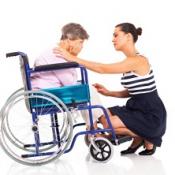 Communication and trust are key ingredients in any relationship, yet are often negatively impacted by the effects of a traumatic experience.
Communication and trust are key ingredients in any relationship, yet are often negatively impacted by the effects of a traumatic experience.
Trust
The very nature of trauma can shatter an individual’s trust in the world and fellow human beings. A survivor’s reduced level of trust can also make communicating difficult and even damage the foundational fabric of a relationship. Many a survivor believes, “I once trusted and I got hurt, therefore I will protect myself by never trusting again.” After trauma, the world and people in general can seem to be completely unpredictable. Danger seems to be everywhere and so a survivor of trauma may feel that they can never put their guard down in order to relax, feel safe, or trust.
These false beliefs about the world—that no one, including oneself, is worthy of trust and that one can never be safe—can be clung to and reinforce each other. Unfortunately, these beliefs are often expressed via impulsive, mean, or aggressive behaviors towards the people closest to the survivor. While the individual may often feel self-hatred or shame for acting in harsh and distrusting manners, to discuss the reality of these behaviors and the impulsiveness and fear behind them would require open communication that may be difficult or impossible at the time.
Listening and Communication
Survivors of traumatic events often struggle with both expressing themselves and listening actively. Active listening requires a certain amount of concentration and can be made more difficult by the presence of hypervigilance. After experiencing trauma, most people’s concentration levels are lower and their levels of hypervigilance higher than their pre-trauma baseline. It can be difficult, if not impossible, for survivors of trauma to process significant chunks of information, making complex or lengthy conversations a significant challenge.
In addition to a potential decline in listening abilities, people who have experienced a traumatic event often shy away from openly communicating. Open and forthcoming communication may be avoided for two types of reasons:
- The individual may want to avoid certain internal experiences. It is common for an individual to not want to experience the emotions, thoughts, or memories that go along with talking about the trauma or to share their internal distress with others because of shame about this this distress.
- The individual may want to avoid certain reactions from their listener. The survivor may choose not to share the horror of the traumatic event out of fear that the listener will become traumatized or not believe them. This fear of being toxic often silences a survivor. A survivor may worry about burdening loved ones with information about the trauma or how the survivor has been impacted. Many individuals also do not communicate about the traumatic life event for fear of judgment and rejection: the worry that by sharing information others will think that the survivor is “going crazy,” overreacting, weak, or should be “over it by now.”
Emotional Bonding
These deficits in trust also negatively impact the opportunities for appropriate emotional and physical closeness, which, like open communication, are an imperative component of any relationship. A survivor of trauma often feels emotionally dead inside. This internal deadness can prevent the individual from experiencing emotions for friends and loved ones and can make it incredibly difficult to receive care, support, and nurturing from these loved ones. Feeling and being emotionally bonded or close is not really feasible.
The absence of a strong emotional bond and the survivor’s heightened state of physiological alertness can negatively impact the physical closeness in a relationship. In a state of hypervigilance and presumption of danger, being touched can set off the person’s safety—fight, flight, or freeze—reactions. The friend or lover who inadvertently triggers the safety response by physically touching the survivor quickly learns to avoid physical contact at all cost. Unfortunately, loved ones often stop trying to connect with the traumatized individual, emotionally or physically, since it can feel like the survivor is actively rejecting the loved one.
Authors Herbert & Wetmore phrase it well when they state that, “It is usually not the case that trauma survivors cease to love the people who were close to them before the trauma, but rather that, for the present, they can’t respond to those people normally, because they have lost access to their capacity to love.” Yet an important distinction to make is that even though a survivor may not be able to feel love, they can still act in a loving manner.
The good news is that these difficulties do not need to be permanent. It is possible, through the slow work of healing, for the survivor to relearn how to trust and feel safe, and for these disturbances or difficulties in emotional and physical closeness to recede. This slow but entirely do-able process is best engaged in with a trained professional. May those of you who are the friends and family of a trauma survivor find an extra ounce of patience and fortitude, and may those of you who are healing from a traumatic life event find validation and the courage to keep growing.

The preceding article was solely written by the author named above. Any views and opinions expressed are not necessarily shared by GoodTherapy.org. Questions or concerns about the preceding article can be directed to the author or posted as a comment below.

 Trauma's Impact on Relationships: Part I
Trauma's Impact on Relationships: Part I When Someone Really Listens, We Heal
When Someone Really Listens, We Heal Women and Posttraumatic Stress
Women and Posttraumatic Stress

